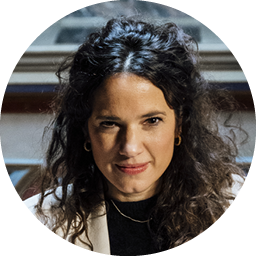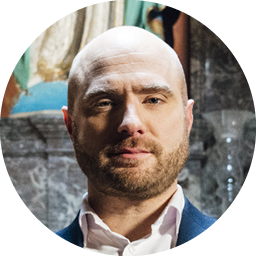Audio & video


Het
onclaaf
C
“All of Flanders is represented with us”
Belgium was gripped by election fever in 2024, with national and regional elections at home and a presidential election in the US. VTM NIEUWS drew massive ratings and HLN saw huge spikes in website traffic. Also Het Conclaaf, the VTM programme in which politicians gathered around the fireplace in Jemeppe Castle, was also a hit with viewers. Eric Goens, the man behind Het Conclaaf, sat down with editors-in-chief Kim Herbots (VTM NIEUWS) and Dimitri Antonissen (HLN) to discuss their political coverage.
Belgium was gripped by election fever in 2024, with national and regional elections at home and a presidential election in the US. VTM NIEUWS drew massive ratings and HLN.be saw huge spikes in website traffic. VTM’s Het Conclaaf, in which politicians gathered around a fireplace in Jemeppe Castle, was also a hit with viewers.
Eric Goens: What was 2024 like for you?
DIMITRI: “Elections are always great when you work in a newsroom: it’s the only time everyone’s working for the same cause, from the local reporters to the anchors.”
KIM: “It was an incredibly busy year, but I’m happy with what we’ve achieved, and things did get smoother as we went along. I probably wouldn’t have minded a third election, actually.”
DIMITRI: “That would have been the American elections.” (laughs)
At what point did you realise things were clicking?
KIM: “During the national elections in June, we were the first to report a string of local results. That’s when I felt that things were working, everyone was dialled in. That evening, we were supposed to interview the winner, and it was touch and go whether Bart De Wever would show up. At the last minute, he did join Cathérine Moerkerke in the studio, and they had a great, substantive conversation. That’s why we do it.”
DIMITRI: “For HLN, the regional elections were even more important. We wanted to beat our competitors to the punch in every province. When Greetje, the head of our regional desk, jumped up and danced for joy in the middle of the newsroom – that’s when I knew: damn, we did it.”
In the confession booth
“I can be tough, but I don’t make it personal”
As an opinion writer at the country’s biggest newspaper, every politician has your number in their favourites...

ISOLDE VAN DEN EYNDE
(38), POLITICAL REPORTER AND OPINION WRITER AT HLN
Read more

“I can be tough, but I don’t make it personal”
As an opinion writer at the country’s biggest newspaper, every politician has your number in their favourites. Is that a dangerous position to be in?
“No. If I were to quit my job tomorrow, the phone calls would stop. As long as I’m still getting calls from both the leader of the opposition and cabinet members, I’m doing a good job. But I wouldn’t say that no politician has ever managed to sway my opinion. If someone calls me, it can add nuance to my analysis. I never go for the jugular, though – I can be tough, but I don’t make it personal.”
You’ve been around for a while now. Are you on your way to becoming the Queen Mother of political journalism?
“If this wasn’t my job, I’d be a criminal lawyer. But I don’t see myself going back to uni for another five years, so I’m afraid the Queen Mother scenario is not unlikely. We’ll find out together whether it’s possible to keep a fresh perspective after 30 years as an opinion writer. At the moment, I still feel excited and driven.”
Do you think people who enjoy working in politics have a few screws loose?
“I’ve asked myself that question on several occasions. (laughs) It’s easy for me to deal with all the political manoeuvring – it’s only when politicians blatantly lie to my face or try to intimidate me that I find it hard to hide my disapproval. But I won’t lose any sleep over it.”
The numbers tell the same story: on election day, you reached 4 million people together, almost everyone who was eligible to vote. You have a huge impact on public opinion. Is that something you’re conscious of?
DIMITRI: “It’s a crushing responsibility, so we’re very much aware of the fact that we have a professional duty. That’s in our DNA. Answering the viewers’ questions comes first.”
KIM: “That means we have to be very honest in what we do: we can’t have a hidden agenda ourselves, and we always have to be wary of those of others.”
More figures: 1.2 million people took the HLN election quiz, ‘The Voice of Flanders’. That’s a third of the electorate. Isn’t that kind of like giving voting advice?
DIMITRI: “That’s absolutely not the purpose of the quiz. By responding to 30 statements, readers can find out which politicians share their views. The outcome can steer people in a certain direction, but the decision is still theirs.
How would you answer that question? You did five episodes of Het Conclaaf, which were watched by 830,000 people – a job well done. Would you have been just as happy if you only had a quarter of those ratings?’
9 June 2024: European, federal and regional elections
4 million people followed the results via VTM NIEUWS and HLN. Over 1.5 million viewers watched The Great Election Show, the big live event organised by VTM NIEUWS. With 2.6 million readers on its app and website, HLN had a record-breaking day.
In the run-up to the elections, Eric Goens brought together the leaders of the seven most important political parties for a weekend at Jemeppe Castle. Het Conclaafattracted an average of 830,000 viewers per episode, and the show’s buzz was recognised with the Impact Prize at the Kastaars! Awards.


13 October 2024: provincial, municipal and district council elections
This was the second most successful day
ever for HLN, with 2.7 million unique visitors. Only at the start of the first Covid lockdown did HLN get more page views.Together, VTM NIEUWS and HLN again reached more than 4 million people.
In 53 municipalities, HLN’s regional journalists were the first to report the election results.
A total of 1.2 million people
completed the HLN election quiz, ‘The Voice of Flanders’.
No, not at all. You don’t make a programme like that for the politicians, but for the viewers, and preferably for a wide audience. There were some concerns beforehand about whether politically minded viewers would find the programme on VTM, but that didn’t interest me. If I have to choose between reaching 100 percent of that specific demographic or 60 percent of the wider audience, I’m always going to pick the latter. As a journalist, you want to make an impact through the things you do, the things you say, the things you write, and all of that is predicated on your reach. But I probably don’t have to tell you that. What are your thoughts on this? How do you achieve impact at scale?
DIMITRI: “I think a recent change in political reporting is that we’re now also showing politicians’ personalities. You don’t vote for someone based purely on your beliefs. And never underestimate your readers: they’re not going to vote for someone because they have a cute dog, but sometimes a detail like that can pique their interest. ‘His dog is cute, but what does he stand for politically?’ Our audience wouldn’t accept it if we changed our approach. In many countries, the media has become very polarised, but our paper is for everyone. HLN’s famous comment section is like the national town square.”
“Every word counts, no matter the tsunami of criticism that follows”
In the confession booth
How will a political junky such as yourself survive the next four years without any elections...

KAREL LATTREZ
(39), POLITICAL REPORTER AT VTM NIEUWS
Read more

“Every word counts, no matter the tsunami of criticism that follows”
How will a political junky such as yourself survive the next four years without any elections?
“I admit: the elections are the main event, but the addiction is strong enough to keep me focused.”
Addict or not, politics still has its ugly sides. Does that ever bother you?
“It is a public arena, but that’s something I can handle quite well. The only thing I sometimes struggle with is seeing how vicious politicians can be to people within their own party. You see these gigantic egos, and their behaviour often comes at the expense of others.”
One thing that stood out during the last elections was the large number of leaked policy proposals. How many of those were your doing?
“Three, but that always happens. I don’t think that it’s worse now than it used to be, or that it’s worse here than in other countries.”
How thin is the line between maintaining good relations with politicians and saying what they want to hear?
“Concerns like that disappear five seconds before I go live. Every word counts, no matter the tsunami of criticism that follows. When politicians want to give us a scoop, we don’t always accept the ‘gift’, so to speak. And when we do, we certainly don’t pull our punches the next day.”
How do you stay sharp in an environment like that?
“The daily drive from Brussels to Ghent is my therapy session. During that car ride, I ask myself if I did a good job, and I’m not afraid to be honest with myself. That’s my personal way of making sure I won’t be howling at the moon with all the other wolves anytime soon.”
Meanwhile, populism is on the rise worldwide, and you do have to reckon with someone like Trump, who doesn’t seem to care all that much about the truth.
KIM: “Then it’s up to us to explain what the facts are.”
DIMITRI: “Admittedly, we’re all still trying to figure out how to deal with populism. Trump is an illusionist, and the media keeps falling for his sleight of hand. It’s our duty to explain how the trick works. It doesn’t matter whether he’s talking about annexing Greenland or building a wall on the Mexican border, the trick is that he gets us all to look where he wants us to look, and we have to resist that.”

You do see this polarisation in the election results. How do you serve the left and the right at the same time?
KIM: “It’s a delicate balance: how much attention do we give to the coalition agreement, and how much to the opposition? A study on news consumption shows that we’re doing a good job: VTM NIEUWS is seen as a big tent – we’re there for everyone. Fortunately, we have 54 minutes each night, which gives us enough time to serve a wide audience. Some will be annoyed, others will agree, but everyone will get something out of it.”
DIMITRI: “Many people are interested in what’s happening on the other side of that divide, so it’s our responsibility to give everyone a voice in the political debate. As long as they’re expressing their own opinions, and as long as the things they say don’t violate our editorial values.”